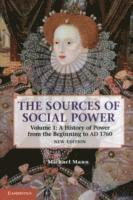
- Format
- Häftad (Paperback)
- Språk
- Engelska
- Antal sidor
- 578
- Utgivningsdatum
- 2012-09-10
- Upplaga
- 2
- Förlag
- Cambridge University Press
- Illustratör/Fotograf
- black & white illustrations
- Illustrationer
- black & white illustrations
- Volymtitel
- Volume 1 A History of Power from the Beginning to AD 1760
- Dimensioner
- 226 x 152 x 36 mm
- Vikt
- Antal komponenter
- 1
- Komponenter
- 23:B&W 6 x 9 in or 229 x 152 mm Perfect Bound on White w/Gloss Lam
- ISBN
- 9781107635975
- 772 g
The Sources of Social Power: Volume 1, A History of Power from the Beginning to AD 1760
- Skickas från oss inom 7-10 vardagar.
- Fri frakt över 249 kr för privatkunder i Sverige.
Passar bra ihop
De som köpt den här boken har ofta också köpt Knife av Salman Rushdie (inbunden).
Köp båda 2 för 612 krKundrecensioner
Fler böcker av Michael Mann
-
Heat 2
Michael Mann, Meg Gardiner
-
On Wars
Michael Mann
-
The Madhouse Effect
Michael Mann, Tom Toles
-
Our Fragile Moment
Michael Mann
Recensioner i media
Reviews of the first edition: 'The ambition of the conception is, against all conventional expectations, matched by the clarity and grandeur of the execution.' The Times Literary Supplement
'This work offers a treasure trove of facts and interpretations that will be useful to readers in many disciplines ...' Choice
'This is a book in the grand Weberian tradition. Mann's conceptual skills and historical grasp are virtuosic and the scope of his enterprise is truly impressive.' Politics and Society
'... an impressively learned, wise, and judicious study. It is a major work - perhaps a great work - and will be a landmark, for sure.' William H. McNeill, University of Chicago
'... a unique brand of historical sociology that is refreshingly iconoclastic, remarkably complex, and breathtakingly ambitious ... a must-read for comparative and historical sociologists.' Contemporary Sociology
Övrig information
Michael Mann is Distinguished Professor of Sociology at the University of California, Los Angeles. He is the author of Power in the 21st Century: Conversations with John Hall (2011), Incoherent Empire (2003) and Fascists (Cambridge University Press, 2004). His book The Dark Side of Democracy (Cambridge University Press, 2004) was awarded the Barrington Moore Award of the American Sociological Association for the best book in comparative and historical sociology in 2006.
Innehållsförteckning
Preface to the second edition; 1. Societies as organized power networks; 2. The end of general social evolution: how prehistoric peoples evaded power; 3. The emergence of stratification, states and multi-power-actor civilisation in Mesopotamia; 4. A comparative analysis of the emergence of stratification, states and multi-power-actor civilisations; 5. The first empires of domination: the dialectics of compulsory cooperation; 6. 'Indo-Europeans' and iron: expanding, diversified power networks; 7. Phoenicians and Greeks: decentralized multi-power-actor civilisations; 8. Revitalized empires of domination: Assyria and Persia; 9. The Roman territorial empire; 10. Ideology transcendent: the Christian ecumene; 11. A comparative excursus into the world religions: Confucianism, Islam, and (especially) Hindu caste; 12. The European dynamic: I. the intensive phase, AD 800-1155; 13. The European dynamics: II. the rise of coordinating states, 1155-1477; 14. The European dynamic: III. international capitalism and organic national states, 1477-1760; 15. European conclusions: explaining European dynamism - capitalism, Christendom, and states; 16. Patterns of world-historical development in agrarian societies; Index.


